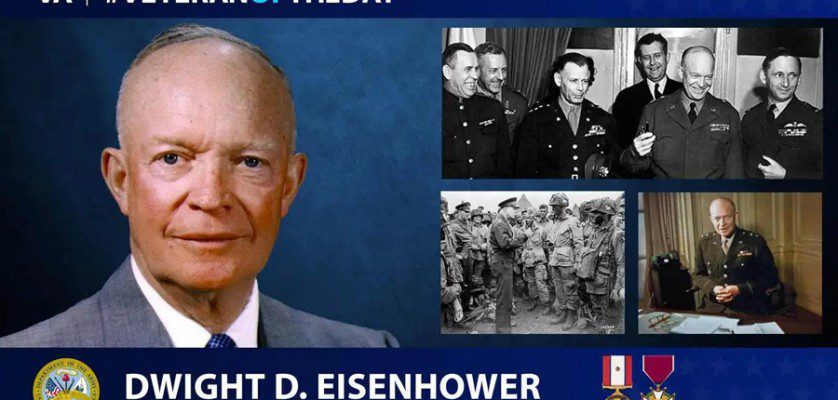Dwight David “Ike” Eisenhower was born in October 1890 in Denison, Texas, the third of seven brothers, and grew up in Abilene, Kansas. He had many interests, including baseball, football, hunting, and fishing. Perhaps most significantly, he had an interest in military history, reading books on the field from an early age. For employment, he worked on a farm and in a bakery, and then, after graduating from high school, he worked in a creamery to support his brother Edgar’s education. Though he himself had planned to pursue normal higher education, he instead earned an appointment to West Point in 1911.
After graduating from West Point in 1915, Eisenhower was first stationed at Fort Sam Houston in San Antonio, Texas. There, he met and married his wife, Mamie Doud, in 1916. When the United States entered World War I, he hoped to serve overseas. His success in training troops, however, led his superiors to assign him to posts within the United States instead, including Camp Colt, Penn., and Fort Meade, Md. Though the Army later ordered him to command a unit in France, the war had concluded before he could begin his new role.
Eisenhower was stationed in the Panama Canal Zone in 1922. He then attended the Command and General Staff School at Fort Leavenworth in Leavenworth, Kansas; the Army War College in Carlisle, Penn., and the Army Industrial College in Washington, D.C., which, in his memory, is now called The Eisenhower School of National Security and Resources Strategy. His hard work eventually earned him a promotion to brigadier general just before the U.S. entry into World War II.
After the attack on Pearl Harbor, Gen. George Marshall asked Eisenhower to devise a plan for the defense of the Philippines. His success impressed Marshall, who eventually promoted him to commander of the European Theater of Operations. In this position, Eisenhower led the invasions of North Africa, Sicily and Normandy.
Eisenhower became a five-star general in 1946, a rank shared with only four Army generals to date. He also served as chief of staff of the Army and, after retiring from active duty, became president of Columbia University. He returned from retirement in 1950, however, to serve as Supreme Allied Commander Europe of the North Atlantic Treaty Organization. Afterward, he ran for and was elected president of the United States in 1952 and again in 1956. As president, he helped to end the Korean War and signed the Civil Rights Act of 1957. He also succeeded in maintaining peace despite confronting conflicts in Vietnam, Hungary, Berlin and other areas. After leaving office, Eisenhower was recommissioned as a five-star general by President John F. Kennedy.
In addition to reaching some of the highest-ranking Army and civilian positions, Eisenhower earned several awards, including the Army Distinguished Service Medal with Oak Leaf Clusters and the Legion of Merit. He also received awards from several foreign nations, including France, the U.K. and the Philippines.
Eisenhower died in March 1969. He had two children, Doud Eisenhower, who died of scarlet fever in 1921 at the age of three, and John Eisenhower. He also had three grandchildren.
We honor his service.










